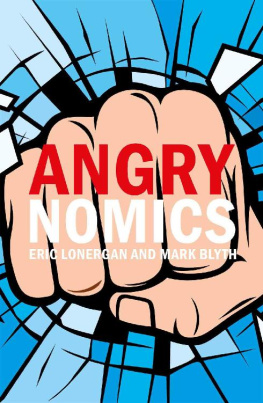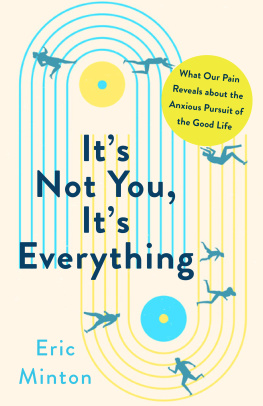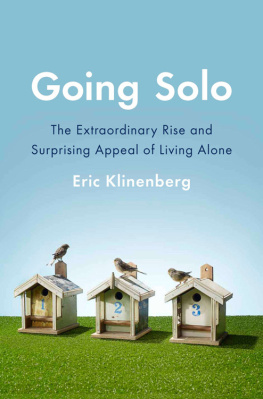Eric Lonergan and Mark Blyth 2020
This book is copyright under the Berne Convention.
No reproduction without permission.
All rights reserved.
First published in 2020 by Agenda Publishing
Agenda Publishing Limited
The Core
Bath Lane
Newcastle Helix
Newcastle upon Tyne
NE4 5TF
www.agendapub.com
ISBN 978-1-78821-278-6 (hardcover)
ISBN 978-1-78821-279-3 (paperback)
British Library Cataloguing-in-Publication Data
A catalogue record for this book is available from the British Library
Typeset by Patty Rennie
Printed and bound in the UK by TJ International
Contents
A man is about as big as the things that make him angry
WINSTON CHURCHILL
A great many colleagues and friends have contributed to the thinking behind this book. Many of them will disagree with much of what follows. We have benefitted hugely from reading and discussing many of these ideas with Martin Wolf, Martin Sandbu, James Mackintosh, Adair Turner, Angus Armstrong, Roger Farmer, Carolina Alves, Anand Menon, Michael Burleigh, Frances Coppola, Daniel Mytnik, James Hanham, Simon Tilford, John Springford, Dave Fishwick, Jenny Rogers, Tony Finding, Tristan Hanson, Juan Nevado, Megan Greene, Simon Wren-Lewis, Kate Raworth, Roman Krznaric, Sony Kapoor, Alev Scott, Rupert Taylor, Clare Patey, Stewart Gilchrist, Nigel Kershaw, Kevin Riches, Matthias Matthijs, Jonathan Hopkin, Stephen Kinsella, Holly Goulet, Joe Hanrahan, Kimberly Witherspoon, Sarah Russo, Vicky Capstick, Rose McDermott, Carys Roberts, Wade Jacobi, John and Shelley Sawers and Matthew Lawrence.
Some of the policy ideas such as dual interest rates have been road-tested in the Financial Times and on Twitter. In the latter forum, we have greatly benefitted from the reflections of Brad Delong, David Andolfatto, Nick Rowe, Tony Yates, David Beckworth and Chris Dillow. Fran Boait and Stan Jourdan at the not-for-profit, Positive Money, have influenced our thinking on policy, as has Gregory Claeys at Bruegel. Steven Gerrard, at Agenda, has once again helped with great insight and care.
Eric would like to acknowledge his partner Corinne Sawerss intellect and sparkle, which has challenged and aided him at every turn. His daughters, Gina and Maia, are a constant inspiration, as is their nonna, Corinna Salvadori.
Mark would like to acknowledge his wife Jules steadfast refusal to engage with anything that he writes. Perhaps this book may prove the exception.
ERIC LONERGAN
MARK BLYTH
Introduction:
from economics to angrynomics
Strong societies can bounce back from a punch in the face. Consider Iceland. If the run up to the financial crisis of 2008 was a party, Iceland was party central. Four Icelandic banks went on a frenzied international expansion and grew their balance sheets (they bought stuff in the hope that it would go up in value) to ten times the size of the economy. When those banks went bust, they took the whole of Icelands economy down with them. An epic punch in the face if ever there was one.
They may have been reckless, but Icelandic bankers and their co-workers had brains. When everything crashed, a lot of those brains went home and played video games its dark much of the time in Iceland. And then they hit on something. Online gaming is a global industry that requires a lot of computing power. Computing power makes heat. Heat needs to be cooled. So why not stick the servers for online gaming, Bitcoin mining, and a host of other things, in the ground in Iceland (the clue is in the name), and run the show from there? Which is what they did. Iceland had supportive institutions that didnt throw unemployed people under a bus, which allowed them to rethink their options and redeploy their capital.
The financial crisis hurt, to be sure, but given those institutions it also encouraged the growth of a whole new set of ideas and innovations that brought the country most screwed by the 2008 crisis back to its feet faster than almost all the others. By 2016, Iceland had fully recovered. Wages were higher than before the crisis, unemployment was low, and consumer confidence was high. Tourism was booming, in part because the crisis a decade earlier had crashed their currency, so it was a cheaper place to visit. Ten years later and the crisis seemed like a bad dream. Icelanders had never had it so good.
It was a different kind of punch in the face when in 2017 waves of angry protests broke out, and in greater numbers and with greater voice than any that had happened in 2008. That anger was triggered by revelations in the so-called Panama Papers, which revealed tax dodging on an epic scale by Icelands political and economic elites. The country that had suffered together through the crisis, had united for an improbably successful football run in the 2016 European Championships, had stuck by each other, and had come out ahead... suddenly got angry. People came [to the protest] because they were so furious said Jonas Haukdal, a Reykjavk ice-cream maker. We thought we were over all that... we thought the scandals were behind us, that we knew what was ethical again. And then we find our prime minister has money offshore, and kept it quiet... It was like a betrayal.
A similar story unfolded in France in 201819. Despite the weakening of austerity policies across Europe and growth returning to France, out of seemingly nowhere hundreds of thousands of WhatsApp-enabled yellow jackets took to the streets in protest. Ostensibly energized by a rise in the tax on diesel fuel, which hits poorer commuters especially hard, their demands expanded, and their networks spread beyond France, all based around a rejection of the cosy consensus engineered by their political elites. In 2019, the citizens of Hong Kong also rose in protest, as did the citizens of Chile, and for many of the same reasons a disconnected elite, rising inequality and skewed advantage.
But this comes as no surprise. Neither that politicians lie, nor that ordinary people get angry at the disconnect between their lives and those of their elites. Indeed, we simply take it for granted that we live in an angry world. This is now the most conventional of all conventional wisdoms, the explanation for events the world over. Oh, well people are very angry over in Germany, Austria, France, the United States, the UK, Indonesia, Hong Kong.... Not only is seemingly everyone angry, but everyone assumes that we understand why that anger is obvious. But is it? Is all anger the same? Why anger, and not passion, or fear, energy, or optimism? In Angrynomics we are seeking to make sense of what appears at first sight to be an incoherent outpouring of a primitive emotion.
When economics becomes angrynomics
To understand what angrynomics is, lets first start with economics. Economics is a set of ideas, a map, that tells us how the world of markets and exchange works. It is also a description of the world in which we live. If the world of economic theory, the map, accurately describes the terrain in which we live, then its a good map. Are these economic maps any good? Thats an open question. In the very few bits of the world where economic theory is directly applied, for example in central bank forecasting departments, highly complex models of the economy called dynamic stochastic general equilibrium (DSGE) models are populated by what are called representative agents. These agents are supposed to be people, but they are strangely ageless, sexless, tasteless, non-ideological, and they live forever.








